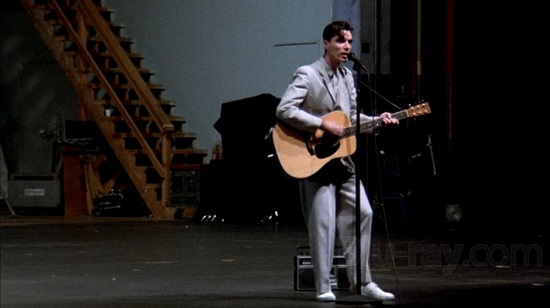The release of Jonathan Demme’s legendary concert film Stop Making Sense on Blu-ray provides another opportunity to investigate what makes the film so great. The claim that it is the greatest concert film ever made is rarely countered. Usually when something is proclaimed as the greatest film or the greatest record there are hordes of naysayers lining up to shoot the claim down. However, Demme’s document of the 1984 Los Angeles Talking Heads shows doesn’t suffer that fate. It usually provokes firm agreement.
Stop Making Sense might be the purest concert film ever made. It’s disinterested in the audience, the dressing room area or seeing the band relaxing or preparing. There’s a devotion to representing the performance cinematically that marks the film out, and it’s no coincidence that so many of the great concert films have been directed by great filmmakers including Martin Scorsese, The Maysles Brothers and DA Pennebaker. The approach of the music fan with a cinematic eye has resulted in films that transcend mere document. Demme is a deep fan, but it is his willingness to make his documentaries ‘films’ that makes him one of the best music filmmakers of all time.
From the first moments it treats the concert as a story and the editing directly corresponds to the narrative flow of the show. David Byrne walks out on to the stage. Rather, the film shows his feet striding to the microphone. A tape player is placed on the floor. A beat starts, a guitar is strummed and Byrne launches into ‘Psycho Killer’. Over the course of the next few songs the rest of band join him one by one. The arrival of their equipment takes place during songs, thanks to the road crew whose presence in the performance is deliberate. At one point Byrne gives the microphone to a stagehand to sing the line that gives the film its title and the roadies and techs are all present for the curtain call. Also deliberate is the fact that until all the performers are present and correct the stage set is an anti-stage. The audience in the auditorium sees the literal backstage area, messy and plainly lit. The filming and editing of this build up is methodical to give a sense that the momentum, the drama, is building, as different elements of the band’s performance are added to the mix. It feels as though new characters are being introduced to the story until all are in place and the show can really start. It’s a brilliant first act.
Shot over three nights, at Hollywood’s Pantages Theater, the film includes a staggering array of camera perspectives, visual ideas and aesthetic approaches to filming the different songs. Frequently the framing is directly face on, audience completely removed, creating the effect of a classic Hollywood musical, where the deft choreography and musical chemistry is allowed to play out uninterrupted. This is brilliantly juxtaposed with some sequences that are edited like 1980s action movies. Further playfulness can be found in the relationship between performer and camera. It is another reason the film works so well. There’s a symbiotic artistic relationship between the filmmaker and the subject – the moments where the film breaks the fourth wall never feel contrived – as much as there is between the performers and their audience. So often concert films maintain a distance from the subject. They rely on standard tropes that convey neither a sense of being there on the part of the viewer nor a sense of cinematic interest on the part of the filmmakers. Stop Making Sense doesn’t fall into that trap. It’s full of Cinema.
The many things that Demme does in the film are often regarded as purely representative of the innovative art-rock band that the film documents, as opposed to the cinematic language opportunities open to all those who direct concert films. It seems, though, that finally the specialness of Stop Making Sense is having practical effect. The playfulness and experimentation of the film can be found in recent music documentaries that seek to represent the artistic value of their subjects but also stretch the staid, conventions of the music doc form. Films such as 20,000 Days On Earth, American Interior or Mistaken For Strangers might seem at first to be light years away in terms of content, but they share a sense of cinematic adventure that mirrors the musical artists they are attempting to capture. Stop Making Sense captures a great band at a great time. It’s not merely the record of a show but a film that approaches the documentation of live music with the same sense of adventure, imagination and flair that the band have in their music. The reason that no one ever really argues with Stop Making Sense being proclaimed the greatest concert film of all time is because it really is that good.
Stop Making Sense is available on blu ray from Second Sight now


